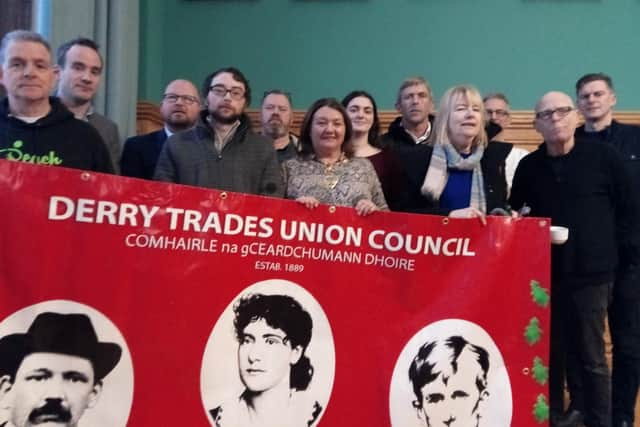Video: Derry workers' charter will target bad employers, say trade unionists
and live on Freeview channel 276
Niall McCarroll, of Derry Trades Union Council, told a public meeting in the Guildhall that it would be launching a new workers’ charter this May Day.
“We are going to be launching a workers’ charter, which highlights the basics of what we believe each employer in this town should adhere to, including: are you friendly to trade unions? And if they are not....then it’s up to us to let the public know that this is not a good employer so the public make a decision.”
Advertisement
Hide AdAdvertisement
Hide AdRedmond McFadden, President of the Chamber of Commerce, who attended the meeting, warned against the potential creation of a ‘blacklist’.


“I am a wee bit worried about the comment around signing up for something and if you don’t sign up for something you are blacklisted. It’s very black and white and there is risk in that in that a good business may, for whatever reasons, not choose to engage or sign because of the connotations of the exercise,” he said.
Mr. McCarroll responded by stating: “It’s not about blacklisting businesses but I certainly believe it is in the public interest.”
He added: “I would certainly want to know where I’m going to spend my money, in a particular café - do they treat their workers correctly and do they respect their workers?”
Advertisement
Hide AdAdvertisement
Hide AdPaul MacFlynn from the trade union-affiliated Nevin Economic Research Institute said zero hours contracts were bad for business and workers.
“There is a U-shaped relationship where there is an initial hit, an initial surge in productivity from moving people onto zero hours contracts as the company can very efficiently deploy workers but it doesn’t last. It’s a sugar hit and the impacts on workers’ productivity and motivation in the company begin to wane and low levels of productivity growth are the last thing that NI’s economy needs,” he said.
Owen Reidy, from the Irish Congress of Trade Unions, said ‘indecent work’ needed to be eradicated.
Derry City & Strabane District Council’s resolution to ban zero hours contracts last year was welcome. The commitments in the ‘New Decade, New Approach’ deal on workers’ rights and employment rights were equally positive, he said.
Advertisement
Hide AdAdvertisement
Hide Ad“They are excellent...it talks about workers having an autonomous voice at work, it talks about workers having decent income, it talks about workers, crucially in a NI context, having sufficient work and having a decent life,” said Mr. Reidy.
Goretti Horgan, of the UCU union and Derry Trades Council, criticised the ongoing casualisation of labour.
“There are businesses in this town - I’m talking about very large ones and very profitable ones - who would only give workers six hour shifts because they don’t want to give them an actual meal break. You have that level of meanness and yet on our side we are supposed to go without food,” she said.
People Before Profit Councillor and NUJ member, Eamonn McCann, said precarity could only be fought by old-fashioned worker mobilisation. “There isn’t a new trick. There isn’t a clever manoeuvre we haven’t thought of in practical terms. It’s as old as the hills.
Advertisement
Hide AdAdvertisement
Hide Ad“The best way to get rid of zero hour contracts and other abuses is to unionise the workforce,” he said.
Mr. McFadden acknowledged a productivity problem but said zero hour contracts was only one facet of this.
“It is a key element of it but productivity in NI is lower than the rest of the UK and we need to collectively look to increase that in whatever way possible. This is certainly one element of it but it’s not a whole panacea,” he said.